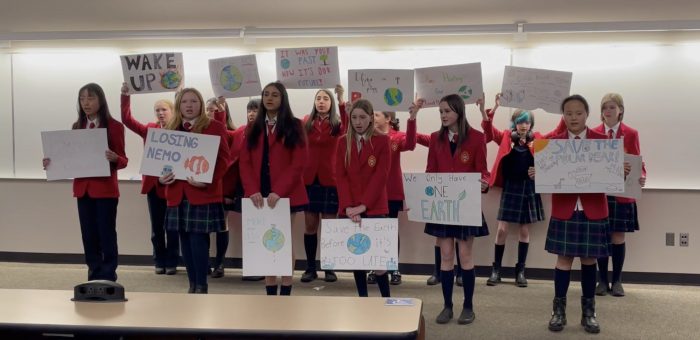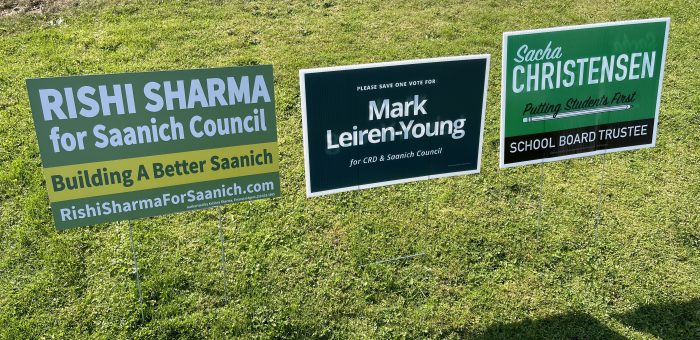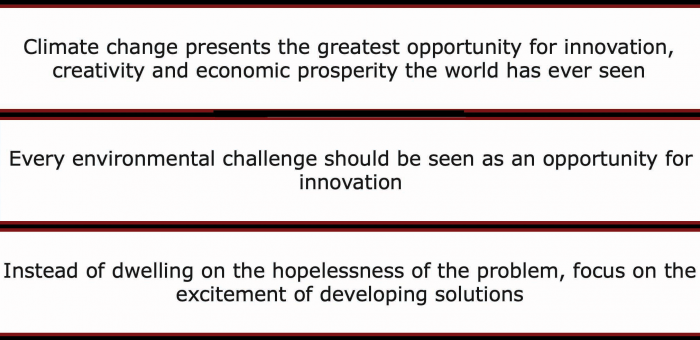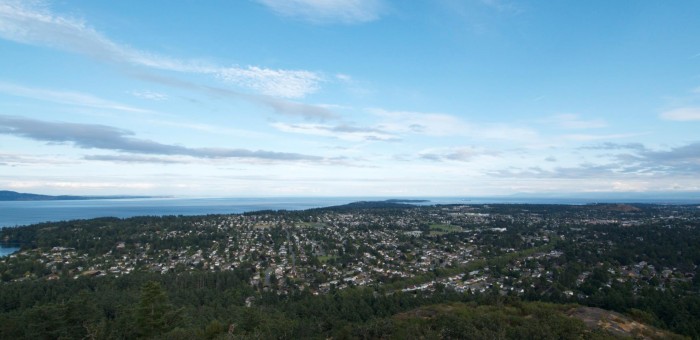Community Blog
Global warming: An intergenerational conversation and plea for action
In February I penned an article arguing that fear-based climate messaging often drives people to despondency and apathy rather than climate action. In this post, I’d like to offer a counter example of how positive, thoughtful climate messaging can inspire people to want to do better. I am grateful to the students and teachers at St. Margaret’s school, Minister George Heyman and the students in my EOS 365 (Climate and Society) class for participating and contributing to an intergenerational conversation on climate change on Monday, March 4, 2024.
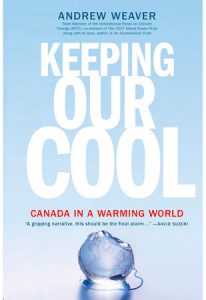 EOS 365 (Climate and Society) is a course I developed at UVic and first offered in 2009. The lectures follow the chapters in the book Keeping Our Cool: Canada in a Warming World that I first published in 2008. In the course I survey the climate system and its interaction with past, present, and future societies, including the onset of agriculture/domestication of animals in the Holocene, the rise and fall of early civilizations, the Anthropocene and global warming. Early in the course I teach a module on science communication. I emphasize that if one wants to advance lasting climate solutions, then one must bring people with you rather than alienating those who may not wish to prioritize climate action. I point out that politicians are elected to represent everyone, not just their support base, and so policy makers need to listen and respond to the views of all stakeholders.
EOS 365 (Climate and Society) is a course I developed at UVic and first offered in 2009. The lectures follow the chapters in the book Keeping Our Cool: Canada in a Warming World that I first published in 2008. In the course I survey the climate system and its interaction with past, present, and future societies, including the onset of agriculture/domestication of animals in the Holocene, the rise and fall of early civilizations, the Anthropocene and global warming. Early in the course I teach a module on science communication. I emphasize that if one wants to advance lasting climate solutions, then one must bring people with you rather than alienating those who may not wish to prioritize climate action. I point out that politicians are elected to represent everyone, not just their support base, and so policy makers need to listen and respond to the views of all stakeholders.
I also suggest to the students that whether or not society wants to deal with global warming really boils down to one question:
Do we the present generation owe anything to future generations in terms of the quality of the environment we leave behind. Yes? or No?
 Science can’t answer that question. But science tells us why this is ultimately the question that needs to be asked. If the answer is yes, then we have no choice but to immediately take steps to decarbonize energy systems for the consequences of unchecked emission growth are profound (widespread species extinction and unparalleled geopolitical instability). If the answer is no, then who cares about global warming?
Science can’t answer that question. But science tells us why this is ultimately the question that needs to be asked. If the answer is yes, then we have no choice but to immediately take steps to decarbonize energy systems for the consequences of unchecked emission growth are profound (widespread species extinction and unparalleled geopolitical instability). If the answer is no, then who cares about global warming?
In class I also note that formulating climate policy is often inconsistent with a four year political cycle as the effects of the policy decisions made today will not be felt in the political lifetime of those making the decisions. Yet these same politicians will not be around in the future to be held accountable for the decisions they did or did not make. And so policies with demonstrable short-term outcomes often take precedence over climate policy. Allocating resources to advance short term “wins” will allow you to point to your political successes in a few years and proclaim “I was responsive to your needs; please re-elect me and I will do more”. It’s next to impossible to do the same with climate policy. But I would argue that there is a moral and ethical imperative to advance climate solutions now if society believes in the importance of intergenerational equity.
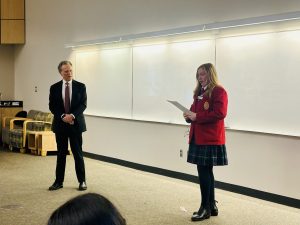 Building on the themes of effective climate communication and intergenerational equity, I hosted an event in EOS 365 on March 4 inspired by the Grade 7 (and 8) students at St. Margaret’s School, Victoria BC. Four generations were involved in the conversation: 1) the St. Margaret’s students; 2) the UVic students; 3) the teachers from St. Margaret’s; 4) the Honourable George Heyman (Minister of Environment and Climate Change Strategy) and me.
Building on the themes of effective climate communication and intergenerational equity, I hosted an event in EOS 365 on March 4 inspired by the Grade 7 (and 8) students at St. Margaret’s School, Victoria BC. Four generations were involved in the conversation: 1) the St. Margaret’s students; 2) the UVic students; 3) the teachers from St. Margaret’s; 4) the Honourable George Heyman (Minister of Environment and Climate Change Strategy) and me.
On February 1 2024, I attended St. Margaret’s Grade 7 Environmental Summit and was blown away by the insight and creativity of the students. The Grade 7 class had been learning about the socioeconomic and environmental ramifications of global warming. Students took on the role of an affected party (e.g. firefighter, fisher, pilot, business owner etc.) and researched how global warming was going to affect them. I listened to numerous testimonies from the Grade 7 students who role-played their chosen characters and was taken aback by their insight and how effectively, and articulately they were able to communicate their stories.
The highlight of the event for me was was when the Grade 7/8 St. Margaret’s choir sang a rendition of an SOS from the kids in front of all those in attendance.
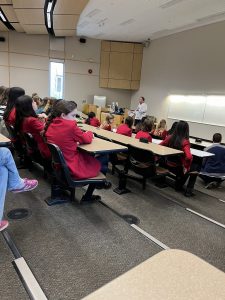 My March 4 class began with the St. Margaret’s grade 7/8 choir, led by Mike Keddy, setting the tone for the rest of our conversation by once more singing an SOS from the kids. At the end of the song, and as the final words “you can do better than this” were sung, Mike Keddy held up a Montreal Canadians pennant (indeed one can do better than that).
My March 4 class began with the St. Margaret’s grade 7/8 choir, led by Mike Keddy, setting the tone for the rest of our conversation by once more singing an SOS from the kids. At the end of the song, and as the final words “you can do better than this” were sung, Mike Keddy held up a Montreal Canadians pennant (indeed one can do better than that).
We were keeping things light and continuing the playful banter that had started at St. Margaret’s School when I noticed middle years teacher Michael Jones had decorated his classroom with some Edmonton Oilers swag. Michael arrived at my class wearing his Oilers jersey, while the TA for the class Katherine Martin proudly sported a Toronto Maple Leafs sweater. She was joined by middle years teacher and fellow Leaf’s fan Meaghan Thompson who showed up with a Leaf’s cap.
And of course, while noting the obvious irony, I adorned my Oilers jersey.
We were honoured to have Minister Heyman attend the class. He had just announced that he was not seeking reelection in the next provincial election moments before we started, and EOS 365 was his first public appearance following that announcement. Once the choir had finished, Minister Heyman spoke about CleanBC and how is government was responding to the challenge of global warming and capitalizing on the opportunity it provides for innovation and creativity in addressing the challenge.
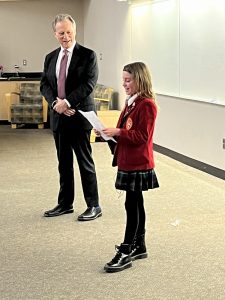 In advance of the class I had given six EOS 365 students copies of the scripts that were going to be read out (see the instagram reel at the end of this post). All six of these students were from the first cohort enrolled in UVic’s new BSc in Climate Science degree program. Each of these students asked the Minister a thoughtful yet probing question that they had prepared in advance and based on the script they were given. The Minister responded in an equally thoughtful way. I role-played the Speaker, and offered the class a supplementary question which was subsequently posed to the Minister. And so we proceeded to explore how the BC government was responding to climate change in six unique sectors.
In advance of the class I had given six EOS 365 students copies of the scripts that were going to be read out (see the instagram reel at the end of this post). All six of these students were from the first cohort enrolled in UVic’s new BSc in Climate Science degree program. Each of these students asked the Minister a thoughtful yet probing question that they had prepared in advance and based on the script they were given. The Minister responded in an equally thoughtful way. I role-played the Speaker, and offered the class a supplementary question which was subsequently posed to the Minister. And so we proceeded to explore how the BC government was responding to climate change in six unique sectors.
This particular class was perhaps the most enriching and rewarding experience I’ve ever had while teaching at the university level. And I started teaching in 1986! My sincere thanks to the students and teachers at St. Margaret’s School, the Minister and his staff, and the BSc in Climate Science and other students in EOS 365 for making this event so successful.
My hope in organizing this event was to demonstrate to my class how positive, hopeful, constructive and solutions-focused climate communication can inspire others to want to take climate action. Too often, activists use fear-based messaging, or outrageous acts of civil disobedience, like throwing soup on a priceless Van Gogh or disrupting traffic and creating chaos on local streets in an attempt to raise awareness as to the seriousness of climate change. As I have argued before, more often than not, such behaviour does little more than drive people to despondency and apathy rather than climate action.
View this post on Instagram
When ideology trumps evidence: The decision to cancel the school liaison officer program in School District 61
On May 31, 2023 and in what can only be described as a textbook example of ideological decision-based evidence-making, Trustees voted unanimously to cancel the school liaison officer (SLO) program in all School District 61 (SD61) schools (the only school district in BC to do so). The Vancouver School Board, which had previously eliminated school liaison officers in 2021, reinstated them in September 2023.
Remarkably, the SD61 decision was reached without consultation with any Police Board in the region or the leadership of either the Esquimalt or Songhees First Nations. In support of their decision, School Board Chair, and former BC Green candidate for Oak Bay-Gordon Head, Nicole Duncan demonstrated a fundamental misunderstanding of the role of SLOs and the community policing model (ironically in a community she wanted to represent in the BC Legislature) by stating “Police are being asked to fill in gaps in student support and to take on roles that should be filled by individuals with specialized expertise, such as youth and family counsellors and social workers“.
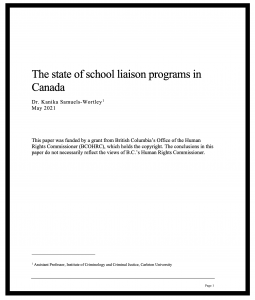 The SD61 decision built on a bizarre press release issued by the BC Office of the Human Rights Commissioner on November 22, 2022: Letter to school trustees on human rights concerns with the use of School Liaison Officers in B.C. schools. While obviously an overreach of the mandate of the unelected BC Human Rights Commissioner, she stated “I strongly recommend that all school districts end the use of SLOs until the impact of these programs can be established empirically. ” I was serving on the the Oak Bay Police Board at the time and was very familiar with Oak Bay’s community policing model and the important preventative role that school liaison officers play in such a model. I had hoped the Human Rights Commissioner letter was supported by extensive research on SLOs in BC Schools. Sadly, all that I could find was a single report commissioned by her office known as the Samuels-Wortley report.
The SD61 decision built on a bizarre press release issued by the BC Office of the Human Rights Commissioner on November 22, 2022: Letter to school trustees on human rights concerns with the use of School Liaison Officers in B.C. schools. While obviously an overreach of the mandate of the unelected BC Human Rights Commissioner, she stated “I strongly recommend that all school districts end the use of SLOs until the impact of these programs can be established empirically. ” I was serving on the the Oak Bay Police Board at the time and was very familiar with Oak Bay’s community policing model and the important preventative role that school liaison officers play in such a model. I had hoped the Human Rights Commissioner letter was supported by extensive research on SLOs in BC Schools. Sadly, all that I could find was a single report commissioned by her office known as the Samuels-Wortley report.
I thoroughly reviewed the Samuels-Wortley report. It provides a literature review of studies pertaining to SLO programs in Canada and the United States. First, it’s important to note that the author states on page 3 of her report “an extensive review of the literature reveals no peer-reviewed studies that explore the impacts of Canadian SLO programs on marginalized students.” In fact, one of the five peer-reviewed Canadian studies the author found pertaining to Canadian SLOs suggested positive outcomes when introduced as a component of a community policing model (Broll and Howells, 2019).
 The US-based research reviewed in the Samuels-Wrotley report focussed on the “school-to-prison” pipeline, violence, US-based SLO training protocol etc. and cannot be generalized to Canada. Even the Toronto Police internal evaluation reviewed in the Samuels-Wortley report is not generalizable to Greater Victoria as they were assessing a targetted SLO program introduced after the fatal shooting of a student at a Toronto high school, not as a key component of a community-policing framework.
The US-based research reviewed in the Samuels-Wrotley report focussed on the “school-to-prison” pipeline, violence, US-based SLO training protocol etc. and cannot be generalized to Canada. Even the Toronto Police internal evaluation reviewed in the Samuels-Wortley report is not generalizable to Greater Victoria as they were assessing a targetted SLO program introduced after the fatal shooting of a student at a Toronto high school, not as a key component of a community-policing framework.
The SD61 decision was also supported by a thoroughly debunked letter from the Greater Victoria Teacher’s Association who had apparently not surveyed their members before coming up with their supposedly (but clearly not) researched ideological position. On the other hand, the Victoria Principals’ and Vice Principals’ Association, whose members are in charge of individual school management wrote a strong letter of support for SLOs to the Board of Trustees that was apparently ignored.
What’s most odd about the GVTA letter is that in April 2018, when I was serving in the BC Legislature as the MLA for Oak Bay-Gordon Head, Victoria Police cut their SLO program after not being given the resources to maintain their frontline services. By December 2018, the Greater Victoria Teacher’s Association began a campaign to get police liaison officer’s back in Victoria Schools that continued into 2019 as school-based incidents started to rise. The GVTA’s dramatic policy lurch strikes me as a textbook example of what happens when one or two idealogues start ramming through their agenda while claiming to speak on behalf of the collective.
 Rather than choosing to consult with those delivering or providing oversight into the SLO program, School Board Trustees seemed to be swayed by those purporting to have uncovered gotcha evidence from FOI information they received. The egregious misinformation brought forward in this regard provided the “evidence” to support the ideological narrative needed to justify a predetermined decision (so-called decision-based evidence-making) to eliminate SLOs from SD61 schools. For example, on X (formerly known as Twitter), one activist offered gotcha ‘proof’ that VicPD were targeting members of the BIPOC community. They pointed out that 19% of all “youth suspects” arrested by VicPD were indigenous whereas only 5% of the population was indigenous. What they failed to point out was that the data they were looking at was aggregate rather than individual data. To illustrate this, suppose there were 100 arrests & one BIPOC individual committed 19 of them. Suppose the other 81 were committed by 81 different other folk. Then the statistic is only 1.2% of people VicPD labeled as “youth suspects” were BIPOC. Perhaps the activists would have served our community better if they educated themselves on the data before making incorrect assertions.
Rather than choosing to consult with those delivering or providing oversight into the SLO program, School Board Trustees seemed to be swayed by those purporting to have uncovered gotcha evidence from FOI information they received. The egregious misinformation brought forward in this regard provided the “evidence” to support the ideological narrative needed to justify a predetermined decision (so-called decision-based evidence-making) to eliminate SLOs from SD61 schools. For example, on X (formerly known as Twitter), one activist offered gotcha ‘proof’ that VicPD were targeting members of the BIPOC community. They pointed out that 19% of all “youth suspects” arrested by VicPD were indigenous whereas only 5% of the population was indigenous. What they failed to point out was that the data they were looking at was aggregate rather than individual data. To illustrate this, suppose there were 100 arrests & one BIPOC individual committed 19 of them. Suppose the other 81 were committed by 81 different other folk. Then the statistic is only 1.2% of people VicPD labeled as “youth suspects” were BIPOC. Perhaps the activists would have served our community better if they educated themselves on the data before making incorrect assertions.
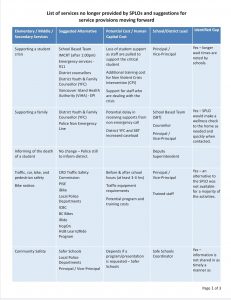 In another example, a powerpoint presentation to a School District committee on SLOs seemed to have been particularly influential even though none of the purported “gotcha” statistics were checked with VicPD and most were misinterpreted. Sadly with gangs now having increased access to schools, vulnerable youth become easy victims for grooming into gang life. But that’s not the only consequence of the irresponsible School Board decision. Here’s an incomplete list of what the Board has identified as services the SLOs used to provide that now fall into the responsibility of already overburdened principals and vice-principals, along with the District’s lone Safe Schools Coordinator. This list also illustrates the challenges faced by schools and students since the removal of the SLOs.
In another example, a powerpoint presentation to a School District committee on SLOs seemed to have been particularly influential even though none of the purported “gotcha” statistics were checked with VicPD and most were misinterpreted. Sadly with gangs now having increased access to schools, vulnerable youth become easy victims for grooming into gang life. But that’s not the only consequence of the irresponsible School Board decision. Here’s an incomplete list of what the Board has identified as services the SLOs used to provide that now fall into the responsibility of already overburdened principals and vice-principals, along with the District’s lone Safe Schools Coordinator. This list also illustrates the challenges faced by schools and students since the removal of the SLOs.
• Longer wait times accessing crisis support for students.
• Loss of student support as staff are pulled to support the critical student.
 • Additional training cost for Non-Violent Crisis Intervention (CPI).
• Additional training cost for Non-Violent Crisis Intervention (CPI).
• Support for staff dealing with the crisis.
• Delays in receiving supports from police departments nonemergency calls.
• District Youth and Family Counsellor (YFC) and School-Based-Team (SBT) increased caseload.
• Alternatives are not available for a majority of activities.
• Additional program, training, and equipment costs.
• Information around community safety is not being shared in a timely manner.
• Reduction in pro-active and collaborative work around internet/social/media/cyber bullying.
• No longer an opportunity to build a positive relationship on a regular basis.
• Increase in vandalism and graffiti on school grounds.
• Students no longer have an opportunity to learn through a police focused lens.
 • There is no longer an opportunity to build positive relationships between police and students on a regular basis.
• There is no longer an opportunity to build positive relationships between police and students on a regular basis.
The following programs or presentations are missing from this list that the District provided:
• Gangs in (BC)
• Personal Safety
• Female Personal Safety
• Halloween Safety
• Healthy/unhealthy Relationships
• Human Trafficking
• LGBTQ Presentations
• PARTY program
• Property & Vehicle Crime
• Shoplifting
• Stranger Danger
• Street Drugs
• WITS program
• Mentor individual students
While at present, the Board of Education is certainly within its right to ban SLOs from their schools, community safety falls within provincial and local government jurisdiction. My hope is that the province will step in to rectify what has happened in SD61 through the introduction of legislation or regulation to ensure that such ill informed decisions cannot occur in the future without either provincial approval or consultation with the affected police boards (charged with oversight of policing). Nobody’s interests are served when our collective safety is undermined by poorly thought through decisions that are grounded in nothing more than ideology and virtue signalling.
I wish to offer my sincere thanks to all police officers in our region for their continued service to our community. I can only imagine how decisions like this, based on nonsensical rhetoric and misleading information, affect your morale. Yet the same activists undermining our region’s policing would almost certainly be the first ones to call for your help when a problem arises. Finally, I can’t imagine how police officers feel as they go to pick their children up at school while dressed in uniform knowing that new school district policy requires schools to log when officers are on school property.
Shame on the Greater Victoria School Board.
Thoughtful voices: Sacha Christensen, Mark Leiren-Young & Rishi Sharma
In 2012, as I started my journey to become the BC Green MLA for Oak Bay Gordon Head, I was only too aware of how difficult it would be to win against the incumbent, BC Liberal Ida Chong. I was running for a party that had never elected anyone at the provincial level anywhere in Canada. There were no “party lists” that we could draw from; there was no party “apparatus” to call upon; there was no real “election readiness” or “provincial strategy”. Each of the BC Green candidates had to organically grow their support from the bottom up. And we did so against difficult odds and without access to organization networks like those associated with the so-called BC NDP ground game. I believed that the pathway to victory involved vowing to do politics differently and promising to work with whomever formed government. Ultimately, this approach was successful and I was able to advance numerous bills working collaboratively with the BC Liberals (from 2013-2017) and then the BC NDP (from 2017-2020).
When we elect politicians to govern on our behalf, we are electing individuals who are each armed with a toolkit of life skills, experiences, qualifications and views. Ideally, each elected person has a complementary, rather than identical, set of tools in their tool kits. For when these complementary tools are spread out on the decision-making table, more creative, inclusive and thoughtful policy and solutions are built. But in my view, what is most important is that we elect individuals who recognize the importance of advancing lasting policy through good governance that transcends traditional partisan divides.
On October 15, we go to the polls in the next general local elections. While I have already voted in an advanced poll for a full and diverse slate of School Board and Council candidates, I wanted to highlight three remarkable individuals on my list. These individuals span the political spectrum, and exemplify what I look for in an elected leader. None of them are presently holding elected office and there are enough incumbents not running to ensure that new people must be at the Saanich Council and School District 61 Board tables. I provide my rationale as to why I voted for these three individuals to help others as they do their research on who they will support on October 15. I recognize the importance of name recognition in local government elections and perhaps by doing this, I might convince a few of you to reach out to the three candidates below to learn more about their compelling campaigns.
1) Sacha Christensen – candidate for SD61 Trustee.
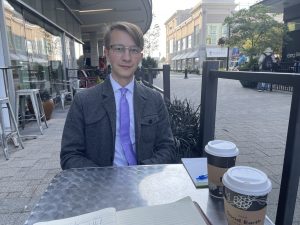 Despite the apparent lack of attention given to school board elections, Trustees in School District 61 actually manage a bigger budget ($268 million for 2022-23) than do the Mayor and Council of Saanich ($222 million for 2022-23). Over the past year, School District 61 was rocked with controversy as two trustees were suspended and subsequently reinstated. The annual budget process was also not without its own public controversy as music and support services took a hit to make ends meet. Given the turbulence of the past year, and with Board Chair Ryan Painter, Angie Hentze, and long time Trustees Elaine Leonard and Tom Ferris not seeking reelection, it is important to elect individuals with demonstrated expertise and experience who understand the importance of a collaborative, as opposed to an adversarial, approach to good governance.
Despite the apparent lack of attention given to school board elections, Trustees in School District 61 actually manage a bigger budget ($268 million for 2022-23) than do the Mayor and Council of Saanich ($222 million for 2022-23). Over the past year, School District 61 was rocked with controversy as two trustees were suspended and subsequently reinstated. The annual budget process was also not without its own public controversy as music and support services took a hit to make ends meet. Given the turbulence of the past year, and with Board Chair Ryan Painter, Angie Hentze, and long time Trustees Elaine Leonard and Tom Ferris not seeking reelection, it is important to elect individuals with demonstrated expertise and experience who understand the importance of a collaborative, as opposed to an adversarial, approach to good governance.
After being told by one of my children that I should consider voting for Sacha, I decided to interview him to learn more about why he was running to be a School Board Trustee at the age of 24. I was extremely impressed by his maturity, thoughtfulness and profound insight into civic and school politics.
Sacha graduated from the challenge program at Esquimalt High School and has completed his first two years of political science at Camosun College. For the past three years he has been working as the constituency assistant in Randall Garrison’s MP office. Constituency assistants play a critical non partisan role in an MP or MLA office. They are the front line staff who interact with and help constituents access the services available to them. As such, they are the public face of an MP or MLA in many community interactions. They should be unconditionally ethical and trustworthy, articulate, have exemplary interpersonal communication skills, hard working, intelligent and empathetic. It became quickly obvious to me why Randal Garrison had hired Sacha.
I asked Sacha why he chose to run to become a Trustee. He pointed out that the present make up of the Board was closer to retirement than to being back in school and that he felt it was critical to ensure students were always front and centre in School Board decision-making. He expressed concern over the 49% 5-year (57% 6-year) indigenous graduation rate in the district and the emergence of the VIVA slate of candidates who he did not believe shared his values. We talked about the lack of funding for students with diverse abilities and the troubling provincial model of education funding. I came away with the impression that Sacha was an exceptionally pragmatic thinker who understands how to advance policy solutions by bringing people together.
In summary, I am very impressed with Sacha Christensen’s collaborative approach to politics, as well as his perspective as a young candidate. I believe he has the expertise and experience to restore good governance to our school board.
More information on Sacha Christensen’s quest to become a Trustee in School District 62 is available on his campaign website.
2) Mark Leiren-Young — candidate for Saanich Council
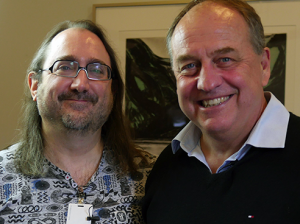 I first met Mark many years ago when he came to interview me at my office at the University of Victoria. Mark was doing a podcast series on trees and I had just completed my book: Generation Us – The Challenge of Global Warming. We hit it off right away.
I first met Mark many years ago when he came to interview me at my office at the University of Victoria. Mark was doing a podcast series on trees and I had just completed my book: Generation Us – The Challenge of Global Warming. We hit it off right away.
A few years later, I once more bumped into Mark on the set of Wes Borg’s live comedy show, Derwin Blanshard’s Extremely Classy Sunday Evening Program, a show that I had become a regular on before I got elected. He sang “Kumbaya” as I proceeded to “beat the character of an Irish ambassador to Canada“, who was cast as a rabid climate change denier on the show, with a large “Nobel prize” prop! It was good-natured humour and Mark and I saw each other in different lights! It was also the last show I did before getting elected! And then in 2017, Mark interviewed me again in the final days of the 2017 provincial election campaign just prior to our historic election result, wherein the BC Greens were afforded the balance of power in the 2017-2020 BC NDP minority government.
Mark has been surrounded by politics his entire life. His mother met his father when she was running for Vancouver City Council and he was covering it for The Vancouver Sun. His father went on to become the legislative reporter for The Sun and then Bill Bennett’s press secretary. Mark also covered politics as a journalist for years and – among other gigs – used to write for a magazine called Trade and Commerce where he helped translate municipal business plans into plain language to draw businesses and investors to municipalities throughout the lower mainland. He was approached about becoming the city hall columnist for a couple of Vancouver’s better media outlets. And he started writing for the Monday Magazine while he was still a UVic student.
Mark is an exceptionally gifted artist and communicator. He’s won numerous awards for his books, television, theatre and film productions and teaches in University of Victoria’s creative writing department. Virtually all of his work, including some of my his commercial work, has involved social or environmental themes. Mark is creative, collaborative, innovative, pragmatic and understands how to work across partisan divides to advance inclusive policy for our community.
More information on Mark Leiren-Young’s quest to become a Saanich Councillor is available on his campaign website.
3) Rishi Sharma — candidate for Saanich Council
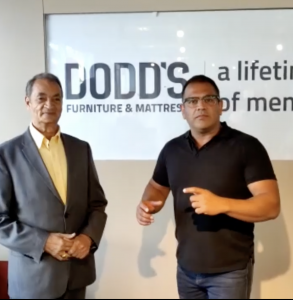 Rishi and I got to know each other in the 2013 provincial election campaign. He was the BC Liberal candidate for the riding of Saanich South and was running against my friend and colleague (from my days in the legislature), Lana Popham.
Rishi and I got to know each other in the 2013 provincial election campaign. He was the BC Liberal candidate for the riding of Saanich South and was running against my friend and colleague (from my days in the legislature), Lana Popham.
While I first met Rishi during an in-studio CFAX 1070 interview/debate early in the campaign, I got to know him better following an all candidates meeting that we we both participated in. Organized by the BC Sustainable Energy Association, this was a packed public event held at the Fernwood Community Centre on the theme: Energy and Climate. Rishi represented the BC Liberals. Rob Fleming (NDP), Duane Nickull (BC Conservatives) and I (BC Greens) were our party nominees. To no one’s surprise, the audience was not particularly warm towards the incumbent BC Liberal government. Yet it was clear to me why the BC Liberals sent Rishi to represent them. He was a compassionate listener and a thoughtful speaker.
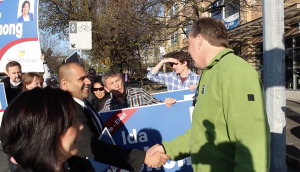 What also struck me early on about Rishi was the respect, ethics and integrity he brought to his election campaign. We were both representing different political parties, yet we were both able to converse in a collaborative way. We focused on our shared values and spoke about how we could advance creative solutions to the issues facing the province. And over the decade since we first met, I have followed Rishi’s work within the BC Government.
What also struck me early on about Rishi was the respect, ethics and integrity he brought to his election campaign. We were both representing different political parties, yet we were both able to converse in a collaborative way. We focused on our shared values and spoke about how we could advance creative solutions to the issues facing the province. And over the decade since we first met, I have followed Rishi’s work within the BC Government.
Unlike many candidates running for local government positions, Rishi was born in, grew up in, and still lives in the community of Saanich. He attended Hillcrest Elementary, Arbutus Junior High and Mount Doug High School. His postgraduate studies include classes at UVic, Camosun and, more recently, Royal Roads university where he is finishing off his MA in Organizational Leadership. Rishi was also an accomplished athlete, playing soccer for Gordon Head, Metro Victoria and the BC Selects, while also competing in field hockey. He continues to give back to the community as a volunteer coash with Saanich Fusion soccer.
One of the things that most impresses me about Rishi is his deep insight into the needs of our community. He is pragmatic, principled, empathetic and respectful in all his work. He also brings business acumen to the decision making table.
More information on Rishi Sharma’s quest to become a Saanich Councillor is available on his campaign website.
Moving on from Provincial Politics: A Climate for Hope
To bring closure to my 7 1/2 years as an MLA for Oak Bay-Gordon Head and 5 years as leader of the BC Green Party I felt it was important to add this video to my archived MLA website. Moving forward, I plan to continue my work on climate solutions on the local, provincial, national and international level.
This YouTube video was produced by Robert Alstead, the same person who created the documentary “Running on Climate”. That documentary provided an inside look into the 2013 election campaign set within a greater climate change narrative.
This YouTube video might be of interest to some as it gives insight as to why I got into and out of politics. The book that I refer to in this video has the working title: “A Climate for Hope” and not “A Vehicle for Change”.
Thank you to the Residents of Oak Bay-Gordon Head
With the announcement yesterday that the province is heading into a general election on October 24, my term as the MLA for Oak Bay Gordon Head has come to an end. This will be my last post on my MLA website.
I would like to thank you, the constituents of this fabulous riding, for extending me the great honour of serving you these last 7 1/2 years. It has been a very rewarding experience for me and I have been so very fortunate to have worked with outstanding constituency staff over this period. If you have contacted my constituency office, you too will have had first hand experience working with these exceptional individuals.
Thank you Judy Fainstein, Perry Fainstein, Devon deLarge, Allie deLarge, Rory Hills, Sarah Miller, Teresa Hartrick and Huxley Johnson.
Over the years I also had the privilege of working with first rate legislative staff. I was first elected in May 2013 and our small but mighty legislative team immediately immersed itself into building a BC Green presence in the BC Legislature. Thank you Taylor Hartrick, Evan Pivnick, Matt Wright, Sarah Miller, Claire Hume, Aldous Sperl and Judy Fainstein for your support during my first term: 2013 – 2017.
With the 2017 election delivering a minority BC NDP government and the BC Greens holding the balance of power, our legislative team grew. I remain grateful to the hard work of Liz Lilly, Macon McGinley, Judy Rendek, Stephanie Siddon and the legislative interns and volunteers who supported our office over the years.
Of course, I would never have been elected were it not for the hard work of the literally hundreds of volunteers who helped me in the 2013 and 2017 election campaigns. I ran on a promise to bring climate policy back to the forefront in BC. And with the establishment of CleanBC, I feel my work is done.
Finally, thank you to the candidates who have stepped forward to seek your vote to represent you as the MLA for Oak Bay Gordon Head in the upcoming election. From the quality of the candidates stepping forward, it is clear to me that our riding will be in good hands moving forward, regardless who wins the upcoming race.
Thank you again.
Andrew

